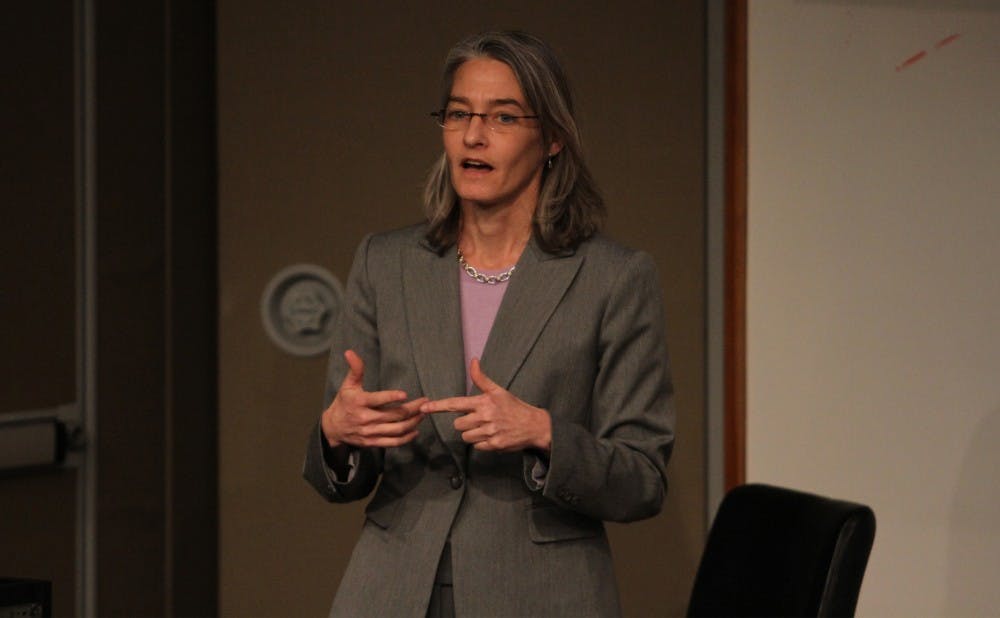The Duke Student Government Senate failed to pass legislation lowering the number of senators and committees.
The Senate defeated an amendment to its bylaw which would have lowered the number of senators from 60 to 36 and would have eliminated the social culture committee during a meeting Wednesday night. The amendment was introduced by senators for academic affairs Jacob Zionce, a senior, and Annie Adair, a sophomore. It was the culmination of many discussions both on the senate floor and in committee meetings about the restructuring of the DSG Senate.
“I’m disappointed in the Senate tonight,” Zionce said. “A third of the people who are in [the Senate] didn’t even show up to the vote, and yet the Senate somehow thinks we’re efficient the way we are.”
The amendment would have cut the number of committees from seven to six and would have allotted six senators to each committee. The committees would have one senator from each class, in addition to two at-large senators. Proponents of the amendment, including Zionce, Adair, and vice president for academic affairs Ray Li, a senior, argued that a smaller senate would be more efficient, engage more senators in discussion and increase senator accountability.
If passed, the proposal would end the Senate's social culture committee. The position of vice president for social culture would also have been replaced by a director of social culture who would serve in the president's cabinet. Zionce and Adair argued that the committee was not essential because many of its projects could be outsourced to other committees.
Opponents of the amendment included juniors Keizra Mecklai, vice president of equity and outreach and president-elect, and President Lavanya Sunder. They explained that a decrease in size of the Senate and the dissolution of the social culture committee would overload remaining senators.
Supporters of the amendment explained that ad-hoc senators, who help in committees but do not vote in the Senate, would be able to fill in those roles. Opponents of the amendment argued that ad-hoc senators cannot be accountable and that the lack of recognition of ad-hoc senators makes people less likely to want to fill those positions.
After hours of debate, the amendment failed 29-19.
“We voted for inefficiency, we voted for the same [Senate structure],” Zionce said. “People all across the student body tell us there are problems in DSG, but tonight we showed that DSG is not ready to respond.”
Executive Vice President Abhi Sanka, a junior, who oversaw and directed the debate, explained that attempts to modify the structure of DSG come along every few years.
“Three years ago we increased the size of the Senate from 40 to 60,” Sanka said. “It seems like there’s a cycle every three or four years. Given the nature of the student government, there’s a desire to change the structure to accommodate the current culture.”
In other business:
Dean of Academic Advising Elizabeth Fox spoke to the Senate about the state of the Duke academic advising program. She focused on the directors of academic engagement, who offer advising to students about opportunities both in and outside the classroom. She also explained that the advising program is adding two directors of academic engagement to offer more focused perspectives on the humanities as well as on natural and quantitative sciences.
Student Organization Funding Committee recognized six new groups: the Duke Climate Coalition, formerly known as Divest Duke, which will advocate and educate in order to fight climate change; the Food Recovery Network, which has created a food recovery network on campus to combat hunger in the community; Blue Devil Games, a video game design studio; Globe Med, which raises awareness about healthcare issues around the world; Duke Energy Club, which is a group for students interested in careers in the energy field; and the Duke Reserve Officers Training Corps group, which will advise and train members of ROTC on campus.
DSG also passed a budgetary statute to move $160,000 left over from the SOFC programming fund to the 2015-2016 annual budget. The unusual surplus size is because of student group de-chartering, which dissolved many inactive groups and put their funding back into the programming fund. The statute was introduced by SOFC chair Davis Treybig, a junior, and Sanka.
A budgetary statute to provide food for the Duke-Durham focus groups was passed. $250 was taken out of the surplus fund to provide pizza for the groups, which will discuss the Duke-Durham relationship as Durham reevaluates its strategic plan. The statute was introduced by vice president for Durham and regional affairs David Robertson, a senior, and senator for Durham and regional affairs Tanner Lockhead, a sophomore.
A budgetary statute to allocate $779.68 from the surplus fund to Femininity Through Culture, a photography project focusing on gender and culture, was passed by the senate. The statute was introduced by senator for equity and outreach Ilana Weisman, a sophomore.
Get The Chronicle straight to your inbox
Signup for our weekly newsletter. Cancel at any time.

